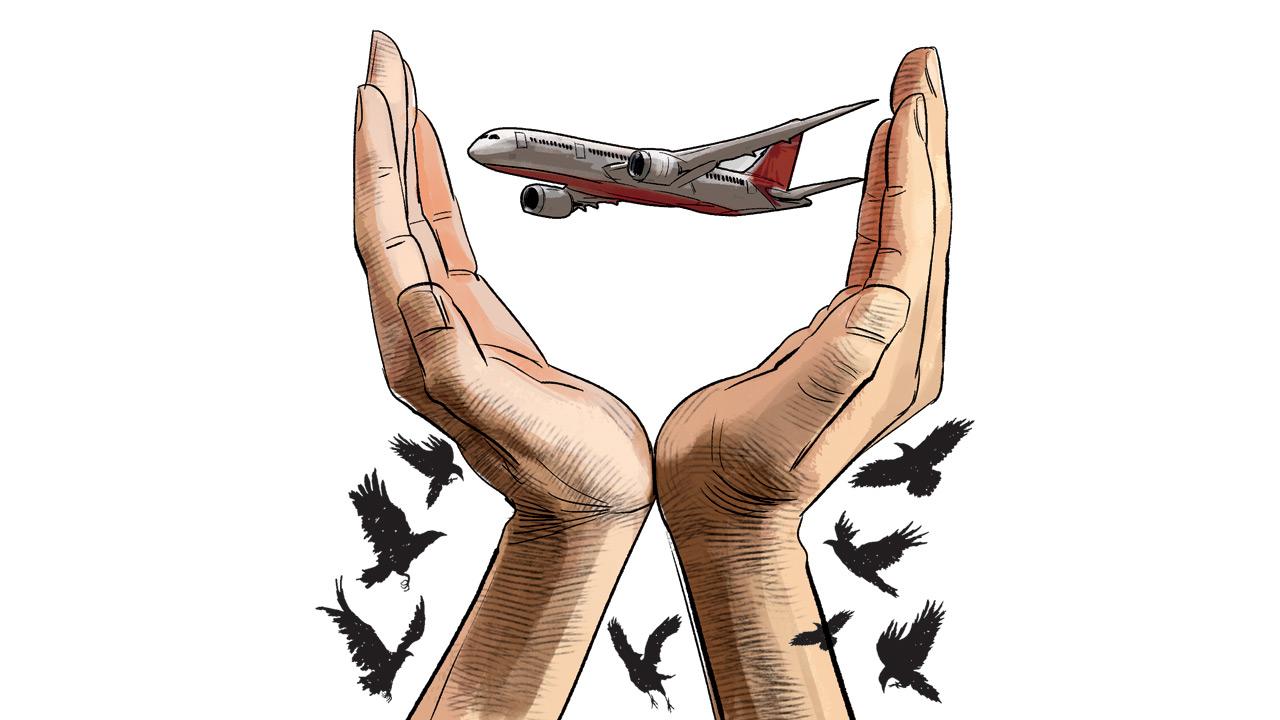It was reported that one pilot experienced a panic attack before a flight to Copenhagen

Illustration/Uday Mohite
![]() Something is written in the skies. It looks lost and lonely.
Something is written in the skies. It looks lost and lonely.
Since the Air India 787 crash on June 12, planes keep returning mid-flight. The reasons are many — bird hits, warfare, newly mandated checks, technical snags. The reasons are all the same: foreboding. We have, many of us, taken flights since the air crash but the anxiety is palpable. Last week, when a plane I was on swooped back up before landing to take a full round, there was a tight hush, a controlled tension in the cabin. No grumbling or the usual banal consumer speak on how there should be better service.
It was reported that one pilot experienced a panic attack before a flight to Copenhagen. Many returning flights report vague technical snags — and you sense that understandably heightened anxiety is the main snag.
The tragedy has pierced a miasma of desensitisation. We have all keenly felt the stories of loss that surrounded the air crash and this has sharpened our awareness of how much violence and callousness surrounds us. A video that haunted me was of a doctor who lived in the medical hostel the plane crashed into. His daughter and domestic staff were both in hospital as a result of the disaster. He had been ordered to evacuate the building without notice. He kept asking for just two days grace time to make an alternative arrangement. “I am not from Ahmedabad. I need time,” he wept helplessly. What is this technical and indifferent system that is incapable of empathy and care? That reduces others to cravenness in a time of despair?
The disquietude around us is like a mass panic attack at how uncared for we really are when bigger, faster and more replace community, connection and care; when net worth replaces value.
Airlines exemplify this spirit. Every step from booking to landing is an encounter with extraction and false promises. Corporate owners of these airlines have thought nothing of sucking their companies dry and then leaving their employees stranded, unpaid, un-cared for. Who knew that’s what it means to “see the world differently”. But eventually, this attitude does not only oppress customers. It leaves everyone equally precarious.
The last decade has given full play to the part of human nature that delights in watching others be squashed and violated and bombed and outcasted, humiliated and jeered at, made defenceless. People who like to position themselves as realists enjoy telling those who express distress at this that it’s just the cycle of life and this is just how human beings are. I guess they are not exactly wrong but that doesn’t make these things right.
A moment arrives when you understand that the system whose callousness of endless profit based on endless unkindness which you might have supported, doesn’t care about you either. We are trapped in that cliché, as in a classic nightmare, wondering how to make our return flight.
Paromita Vohra is an award-winning Mumbai-based filmmaker, writer and curator working with fiction and non-fiction. Reach her at paromita.vohra@mid-day.com
 Subscribe today by clicking the link and stay updated with the latest news!" Click here!
Subscribe today by clicking the link and stay updated with the latest news!" Click here!










